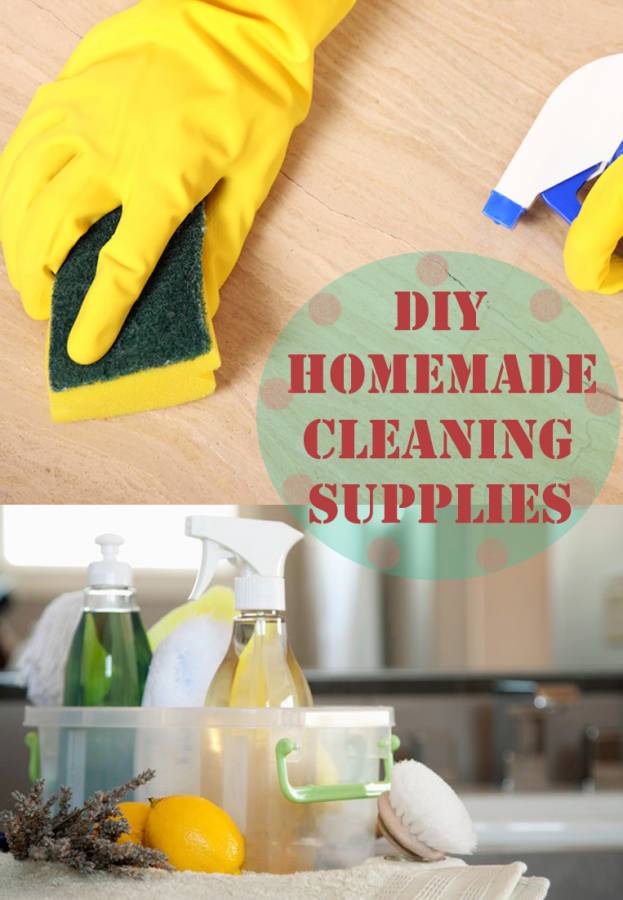
Homemade cleaning products are not only great for the environment, they are also easy on the checkbook and easy to make. Reducing the chemicals in your home can also help eliminate illness. Save your money by learning how to make your own cleaning products. With a few basic ingredients that are found in most kitchens, you can make your own non-toxic cleaning products and never have to buy chemical products again.
The basic ingredients for cleaning products are white distilled vinegar, baking soda, washing soda, pure liquid soap, and tea tree oil. Other ingredients may be used too, such as olive oil and lemon juice. Pure Liquid Soap can be found in health food stores. Spray bottles and jars to contain and dispense the cleaning products can be purchased at local discount stores or your nearest department store.
There are many recipes online that teach people how to make home-made cleaning products. Some recipes are simple, while others are extravagant. Most people would agree that simple is often better, so here are several simple recipes for cleaning:
*Mold and Mildew Cleaner*
I’ve used this recipe on bathroom tiles, windowsills, and even in damp corners of the basement. It gets the job done!
What You’ll Need
- Spray Bottle
- White Vinegar (1 cup)
- Water: (1 cup)
- Baking Soda (1 tablespoon, optional)
- Tea Tree Oil (10-15 drops, optional)
- Lemon Juice (2 tablespoons)
- Soft Scrub Brush or Toothbrush
- Microfiber Cloth
Follow these simple steps to make your own mold and mildew spray:
1. Mix the Ingredients
In a spray bottle, combine 1 cup of white vinegar, 1 cup of water, and 2 tablespoons of lemon juice. Add 10-15 drops of tea tree oil for extra antifungal properties, if desired. Shake the bottle well to mix everything.
I keep this spray on hand because it works on so many surfaces, and I think it smells better than store-bought mold sprays.
2. Spray the Affected Area
Generously spray the solution onto the affected surface. Let it sit for 10-15 minutes to break down the mold. For tougher spots, sprinkle a little baking soda on the area before spraying.
When I used this on my bathroom tiles, I let it sit while I finished another chore to give the spray more time to loosen the mold.
3. Scrub and Rinse
Use a soft brush or toothbrush to scrub the area gently. Focus on grout lines and other crevices where mold tends to hide. Wipe the area clean with a damp microfiber cloth, and rinse with warm water if needed.
4. Dry Thoroughly
Use a dry microfiber cloth to wipe away any remaining moisture. Keeping the area dry is key to preventing mold and mildew from coming back.
I always crack a window or turn on a fan after cleaning damp areas. Good airflow makes a big difference in keeping everything dry.
More DIY Cleaning Ideas:
*Soft Scrubber*
½ C baking soda
Pure liquid soap
Take a bowl and mix about ½ cup of baking soda and just enough liquid soap to make a frosting-like texture. Place the mixture onto a sponge and clean the desired surface. This recipe is great for countertops and bathtubs because it won’t leave a gritty residue.
The soft scrubber recipe is so simple that you can make it up as you need it, or store it in a glass jar with 1 teaspoon of vegetable glycerin to keep the product moist. Lemon can also be added to add antibacterial and antiseptic properties to this cleaning scrub. You could also pour baking soda directly onto half of a lemon to scrub stubborn surfaces, stains, and dishes. Lemon is a natural bleaching agent and can also help dissolve soap scum and hard water deposits.
Baking soda is an abrasive cleanser that also acts as a natural deodorizer. It can dissolve dirt, grease, mildew, and even wax. Adding a ½ cup of baking soda to the rinse cycle in your washing machine will help remove odors from cloths. Place a box in the fridge and freezer to absorb food odors. Sprinkle baking soda on your carpet before vacuuming to eliminate pet and food odors and sprinkle it at the bottom of garbage bins and litter boxes to eliminate odors. Baking soda is also wonderful at cleaning and polishing metals and plastics.
*Oven Cleaner*
1 C or more baking soda
A squirt or two of pure liquid soap
Water
A home-made oven cleaner is almost the same recipe as the soft scrubber. When cleaning an oven, first generously sprinkle water over the bottom of the oven. Then, cover over with baking soda so that the surface is totally white. You may need to put extra baking soda on spots where food has spilled. Sprinkle with more water. This needs to set overnight. The next morning, take a sponge and wipe up the grease and grim. If needed, add a bit of pure liquid soap to a sponge and wash any remaining residue from the oven. If this recipe doesn't seem to work, it is probably because more baking soda and/or water was needed. Try again.
*All Purpose Spray Cleaner*
2 cups hot tap water
1/2 teaspoon washing soda
A dab of liquid soap
Add all ingredients to a clean spray bottle. Shake mixture until the washing soda has completely dissolved. Spray onto the desired surface and wipe off with a rag or sponge. This spray cleaner will not spoil.
*Window Cleaner*
3 tbs vinegar
1/4-1/2 tsp pure liquid soap
2 cups water
Spray bottle
Take a clean spray bottle and place all ingredients inside. Shake to mix the ingredients and use as you would any commercial window cleaner. The liquid soap will remove any residue from previous cleanings with commercial window cleaner. Simply refill the spray bottle as the cleaner runs out. This product will not spoil.
*Furniture Polish*
1/4 cup vinegar or fresh lemon juice
1/2 teaspoon oil, such as olive (or jojoba, a liquid wax)
Place ingredients into a glass jar and mix. Use a rag to dip into the solution, using a small amount, and wipe onto wood surfaces. As long as this stays covered, it can be stored indefinitely.
Lemons can also be used to clean and shine brass and copper. Cut a lemon in half and dip in salt to scrub copper fixtures.
*Vinegar Disinfectant and Deodorizer*
Vinegar
Spray bottle
Keep straight vinegar in a spray bottle in your kitchen and bathroom for cleaning. The vinegar is great for cleaning the toilet rim, simply spray it on and wipe it off. Vinegar is also great for cleaning cutting boards, just spray on, let sit overnight, and wash off with water in the morning. Any vinegar smell will dissipate within a few hours.
This mixture is also great for cleaning appliances, stone and brick surfaces, windows, and to wash the bathroom floor. You can also pour ½ cup of vinegar into the rinse cycle instead of using fabric softener.
*Bleach Alternative*
Lemon juice
Lemon juice can be used directly on white linens and cloths to bleach away stains. Simply pour the lemon juice on the fabric and sit in the sun to dry. The combination of the lemons and direct sun light will make stains disappear.
*Dishwasher Detergent*
2 tbs Borax Soap
1 ½ tbs baking soda
Mix these together and place into dishwasher detergent receptacles to wash dishes.
*Drain Cleaner*
½ C baking soda
½ C white vinegar
1 Gallon hot water
Pour the baking soda down the drain, followed by the white vinegar. Cover the drain for at least 15 minutes. Uncover and pour 1 gallon of hot water down the drain to get ride of clogs and build-up.
Home-made cleaning products cost about one-tenth of the price of store bought cleaning products. They are also eco-friendly and super easy to make. Learning how to make your own home-made cleaning products is a wonderful way to live greener or simply save your money. Reducing synthetic chemicals in the home can also help lesson symptoms of asthma, allergies, bronchitis, and sinusitis (as stated by the US National Center for Health Statistics).
